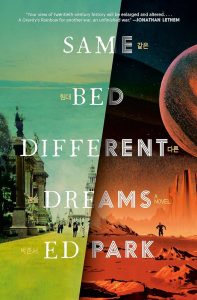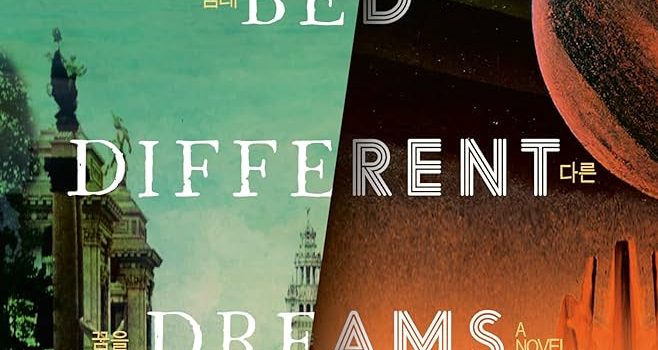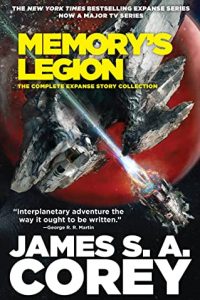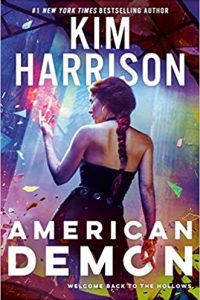Jake Casella Brookins Reviews Same Bed Different Dreams by Ed Park
 Same Bed Different Dreams, Ed Park (Random House 978-0-8129-9897-9, $30.00. 544pp, hc) November 2023. Cover by Will Staehle.
Same Bed Different Dreams, Ed Park (Random House 978-0-8129-9897-9, $30.00. 544pp, hc) November 2023. Cover by Will Staehle.
Framed from the perspective of Soon Sheen, a writer-turned-tech worker, Ed Park’s Same Bed Different Dreams is an intricate and entertaining puzzlebox of a novel, an expansive and allusive meditation on Korean history and much else. Soon works for GLOAT, a giant and quietly dystopian tech company in the mold of Google or Apple, but he used to be a writer and still has connections in the arts world. Invited to a soiree for Asian and Asian American literati, he acquires an early draft of a much-hyped Korean novel, Same Bed, Different Dreams. “We might lose the comma,” its translator confides, and it claims to be “a true account of the Korean Provisional Government,” the KPG, that has long sought freedom and reunification for the country.
Unfortunately, Soon’s dog steals and buries the manuscript, and he spends much of the rest of the novel hunting its chapters down. Interspersed with the “true account” – carefully arranged and numbered snapshots of characters throughout the last century or so of Korean history as well as, for some reason, a long aside on President McKinley’s assassin – are scenes of Soon’s home and work life, and an expanding cast of characters and viewpoints that all, somehow, tie in to that history. As immersive video games, magazines about gazebos, and hints of emergent AI are placed right next to richly textured bits of ephemera from a century of political intrigue and attempted revolutions, it becomes increasingly hard to keep track of what’s historical and what’s fictional – which is very much part of the novel’s charm.
Woven through this complicated tapestry is a very science fictional, indeed meta-science-fictional, thread. Parker Jotter, a Black American pilot shot down in the Korean War, returns home to Buffalo, NY, and proceeds to write a series of trippy SF novels – the plots of those novels, their eventual adaptation into an obscure multimedia franchise, and the whereabouts and actions of Jotter and his family wind up being deeply tied to the intricate plots of Same Bed Different Dreams. It’s a fascinating angle – Jotter’s work itself sounds like something out of Philip K. Dick, but the way Park uses the stories, what they’re reaching for, and the circumstances of their creation is doing something yet stranger, if more humble. There’s a lot here that rhymes with Lavie Tidhar’s recent The Circumference of the World, which centers a vast conspiracy on a lost (and fictionalized) Hubbard novel; in its melancholy and its deep sense of history, how even the most fantastic storytelling is rooted in actual people and places and relationships, Same Bed Different Dreams also recalls Michael Zapata’s superb The Lost Book of Adana Moreau, which uses another fictional SF novel to stitch together a complex intergenerational story.
I’ve done no more than gesture at the elaborate outlines of this novel; what such a description fails to convey is how immensely fun and inventive Same Bed Different Dreams is. From chapter to chapter, Park shifts tone and style – it’s not overly dramatic, but there’s an immediately recognizable texture change as you move between viewpoints, and the subtly changing fonts are a nice touch, as well. There’s a grace and a startling fluidity to these changes that keep the novel feeling fresh and engaging despite its complexity. It’s really quite funny, juxtaposing its imposing elements – the atrocity of war, the complexity of racial identity – with absurdity, with a lively and drily humorous approach to the quotidian, its characters and their relationships.
Key to this playfulness is the novel’s relationship to mystery: Soon is guiltily conscious, in a way that implicates the reader, of his own ignorance of Korean history, leaving him unsure what’s factual, what’s fictional, and what’s aspirational about this Provisional Government. Same Bed Different Dreams also repeatedly indicates its interest in codes, in wordplay and encryption: the possible meanings of Jotter’s “2333” titles and the way their characters show up outside the fiction; numerological poems and cults; and, most amusingly, its recurrent fascination with anagrams. (One character once wrote a line-by-line anagram of Eliot’s “The Waste Land”, “The Newt Salad,” a personal favorite.) One quickly gets the sense that there are connections and messages behind the obvious at every turn; whether deadly serious or merely deadly clever isn’t always apparent. This isn’t a novel that requires you to do your own sleuthwork to figure out the plot, but it’s also not one that leaves you feeling like you’ve learned it all in one reading – there are clearly depths here, multiple interpretations, ambiguities and other solutions.
Yet what anchors Same Bed Different Dreams, as much as this sometimes-playful, sometimes-mournful ambiguity, is its specificity. Soon and Jotter are fully realized and realistic voices, as are the many other characters the novel leaps to. As are its historical figures – even if told in brief, tiny details and artifacts like glassed-in exhibits, they have that undeniable trace of authenticity. Soon’s Hudson Valley, Jotter’s Buffalo, and the KPG’s much-contested Korea (and many locations further afield) are all deeply grounded – rather than dispelling the stranger, more nebulous and fantastic aspects of the novel, they emphasize them, enable them. It’s a masterful and unpredictable work, and highly recommended.
Jake Casella Brookins is from the Pennsylvania Appalachians, and spent a fantastic amount of time in the woods. He studied biology, before switching over to philosophy & literature, at Mansfield University. He’s been a specialty coffee professional since 2006. He’s worn a lot of coffee hats. He worked in Upstate New York and Ontario for about 8 years. He’s been in Chicago since 2013; prior to the pandemic, he worked for Intelligentsia Coffee in the Loop. Starting in 2021, he’s been selling books at a local indie bookstore. He lives with his wife, Alison, and their dogs Tiptree & Jo, in Logan Square.
This review and more like it in the February 2024 issue of Locus.
 While you are here, please take a moment to support Locus with a one-time or recurring donation. We rely on reader donations to keep the magazine and site going, and would like to keep the site paywall free, but WE NEED YOUR FINANCIAL SUPPORT to continue quality coverage of the science fiction and fantasy field.
While you are here, please take a moment to support Locus with a one-time or recurring donation. We rely on reader donations to keep the magazine and site going, and would like to keep the site paywall free, but WE NEED YOUR FINANCIAL SUPPORT to continue quality coverage of the science fiction and fantasy field.
©Locus Magazine. Copyrighted material may not be republished without permission of LSFF.








